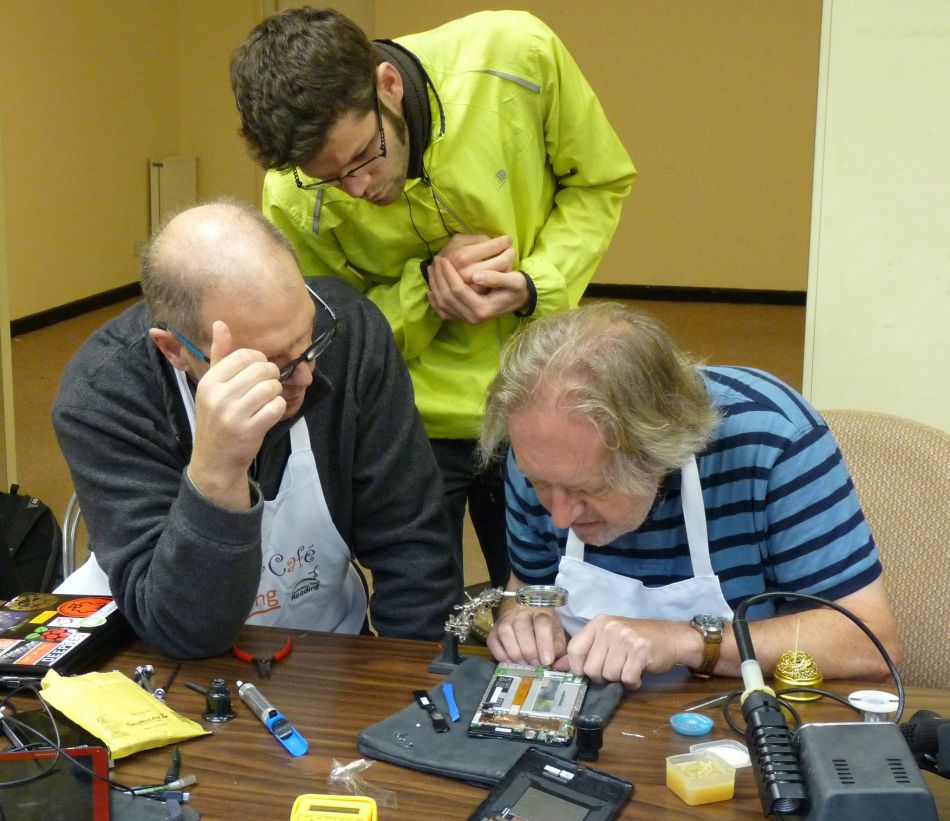Repair Cafés: An Old Approach to New Tech
Greggory Moore | Moore Lowdown

image by: Karen Blakeman
Part and parcel of our conspicuous consumerism is to buy new products even when the old ones can be repaired. It's an insidious cycle that may lead to ruin. But some people are trying to fix the problem⎯literally.
In the mid 1920s, executives at General Electric and the other major players in the manufacture of light bulbs got what they thought was a bright idea. Electric lights were already big business, and the bigwigs who convened in Geneva on December 23, 1924, were interested in making the business not only bigger but also more profitable. And they had enough business acumen to know that bigger, along with the financial bottom line, could be at odds with better. They called themselves the Phoebus cartel, and they colluded to cut the lifespan of the bulbs they produced by as much as half so that consumers would be forced to replace them more frequently.
Thus was planned obsolesce brought into the world, a perversion of the ethos that a product should be built to last. It's a business strategy that's become increasingly popular during a century of mass production, shaping a contemporary global society in which each year over 150 billion garments are produced and well over 1.5 billion smartphones are sold.
But there is a growing movement amongst consumers to consume less by fixing the products they have rather than simply tossing them on the scrapheap and buying a newer version.
The Restart Project exemplifies this trend. "We're fixing our relationship with electronics," the self-described 'social enterprise' proclaims, "putting people and the planet at centre." That means getting individuals, communities, and schools off the treadmill of disposing of perfectly repairable—and even perfectly working—electronic devices just to get a newer model. "Electronic waste is one of the fastest growing waste streams in many countries including the UK," says the London-based registered charity. "While recycling is important, we intervene before disposal— inspiring people to buy for longevity and to divert electronics from waste."
Formally established in 2013, the Restart Project's front line in its attack on electronic waste is the grass-roots level, holding community and workplace events called Restart Parties, "hands-on, learning events where we help people fix their own electronics—and help others to do the same globally." The events, which usually last around three hours, can be held at pubs, community centres, libraries, galleries⎯anywhere with tables, electrical outlets, and WiFi. "We believe that repair is fun!" say co-founders Janet Guntner and Ugo Vallauri. "We play music, and encourage people to bring food to share. An informal, community atmosphere is key to making repair less scary and more accessible."
According to The New York Times, the origins of the concept can be traced back to Martine Postma, a Dutch woman who felt increasingly concerned about the environment after the birth of her second child.
"In Europe, we throw out so many things,” she told the Times in 2012. “It’s a shame, because the things we throw away are usually not that broken. There are more and more people in the world, and we can’t keep handling things the way we do."
Inspired by an exhibit about the benefits of repair and recycling, in 2009 she came up with the concept of Repair Cafés, neighborhood gatherings where people get together a few hours a month to fix everything from garments to bicycles to kitchen appliances.
"We throw away vast amounts of stuff. Even things with almost nothing wrong, and which could get a new lease on life after a simple repair," says the Repair Café Foundation, a nonprofit organization Postma founded in 2011. "The trouble is, lots of people have forgotten that they can repair things themselves or they no longer know how. Knowing how to make repairs is a skill quickly lost. Society doesn’t always show much appreciation for the people who still have this practical knowledge, and against their will they are often left standing on the sidelines. Their experience is never used, or hardly ever."
The Repair Café Foundation provides institutional support and guidance to help local groups initiate their own Repair Cafés. To date, the Foundation has fostered nearly 1,700 Repair Cafés globally. "People who might otherwise be sidelined are getting involved again," the Foundation notes. "Valuable practical knowledge is getting passed on. Things are being used for longer and don’t have to be thrown away. This reduces the volume of raw materials and energy needed to make new products. It cuts CO2 emissions, for example, because manufacturing new products and recycling old ones causes CO2 to be released."
As big as Earth may seem, it is far from unlimited. Its resources and space are limited. With each product we make, we have that much less resources; and with each product we discard, we have that much less space. A planetwide population of 7.5 billion and rising means our demands for resources and space are increasing all the time.
In the face of such a reality, we would do well to reuse as much as possible, rather than perpetuating the 20th-century invention of conspicuous consumerism and wastefulness in the name of monetary profit. We used to fix things whenever possible. We can fix them again.

Introducing Stitches!
Your Path to Meaningful Connections in the World of Health and Medicine
Connect, Collaborate, and Engage!
Coming Soon - Stitches, the innovative chat app from the creators of HWN. Join meaningful conversations on health and medical topics. Share text, images, and videos seamlessly. Connect directly within HWN's topic pages and articles.
















